Between frustration and persistence, the Georgian protest movement reflects on 4 October
After the unfulfilled ‘peaceful revolution’ of 4 October, Georgia’s anti-government movement continues amidst debate, repression, and uncertainty.
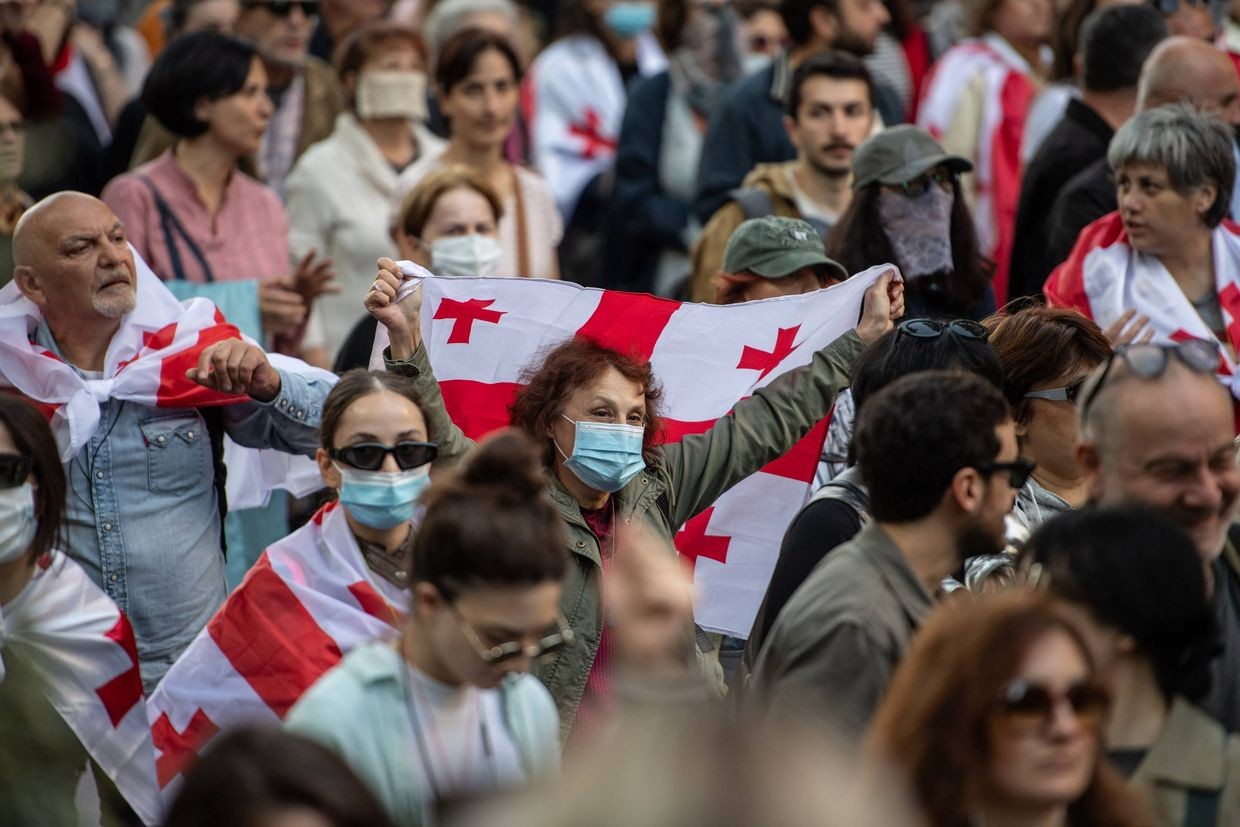
On 8 October, the 315th day of Tbilisi’s ongoing anti-government protests, the scene on central Rustaveli Avenue outside parliament looked familiar. As a small crowd already blocking the road waited in front of the building, a march from the upper streets joined in.
‘We are here, we are fighting, we have not been defeated!’, an anti-government activist chanted through a loudspeaker.
This show of defiance wasn’t accidental. Only four days had passed since the massive 4 October demonstration, when some opposition figures had promised — but failed — to swiftly bring down the Georgian Dream government through a ‘peaceful revolution’.
‘I left completely shattered. It was a terrible feeling and I still can’t get over it’, 70-year-old demonstrator Maka Javashvili tells OC Media, expressing her disappointment over how chaotic and ultimately futile the 4 October rally was.
After the promised change failed to materialise, and the government’s pressure on protesters grew even harsher, grassroots activists behind the daily demonstrations called on the public not to retreat in frustration but to return to the streets and show that resistance was still alive.
It was one of the reasons why Javashvili, who can’t attend the protests every day due to her age, decided to step outside once again.
‘I forced myself to come today. I thought, if no one shows up, then what will happen?’, she says.
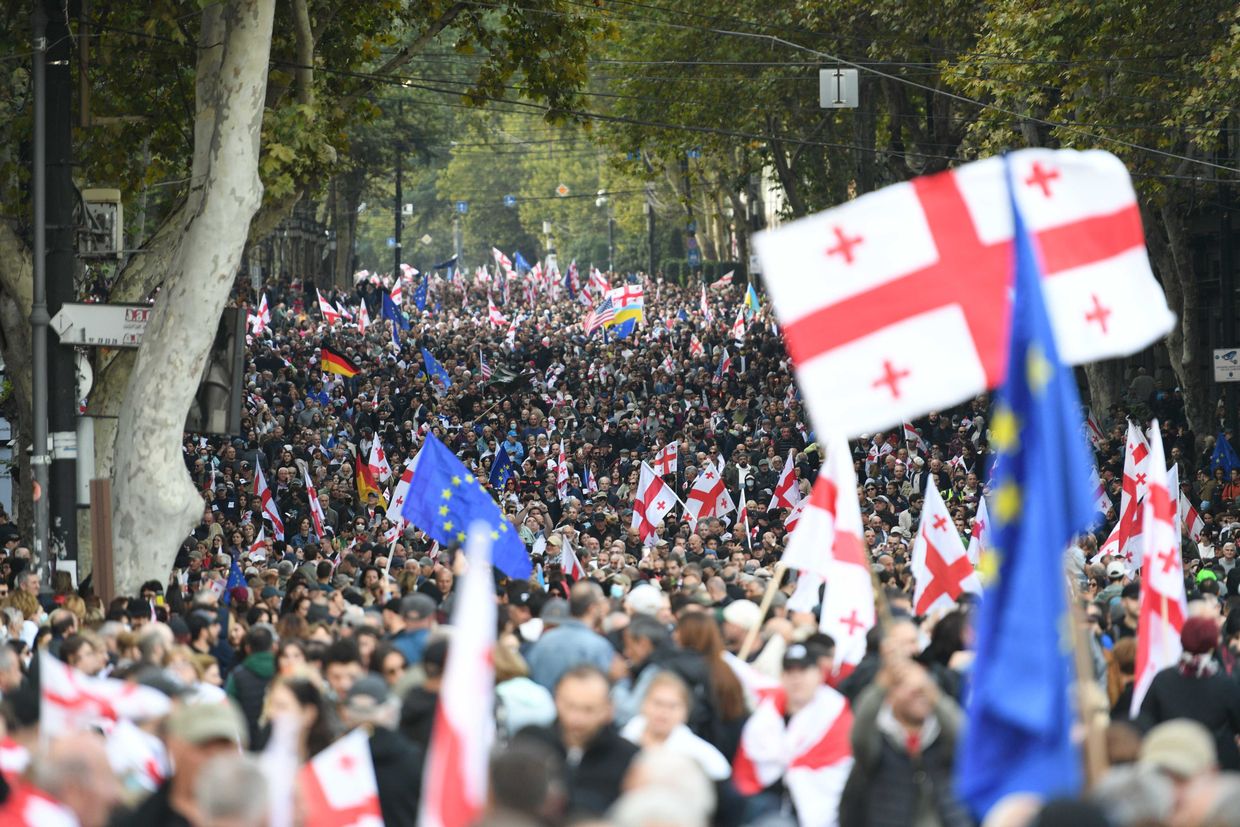
The events of 4 October and the days that followed have sparked intense debates within Georgia’s anti-government movement, which has been holding daily protests since 28 November 2024, after the ruling Georgian Dream party suspended the country’s EU membership bid following disputed parliamentary elections.
Questions arose not only about what exactly happened on that day and how it affected the protests, but also about how the movement should navigate growing state repression — and whether, in the current climate, the rapid change promised by the much-hyped yet ultimately ambiguous ‘revolution’ was ever truly possible.
Another long-standing question has also resurfaced: where are the political parties in the protests, and do they have any prospect of taking initiative within a leaderless movement, especially given issues of legitimacy, internal rifts and direct threats of bans from the authorities?
At this point, the questions outnumber the answers.
The fallen fence — a brief story of a troubled protest
The story of 4 October began in summer 2025, when opposition figures promised to end Georgian Dream’s 13-year rule in a single day, without announcing any concrete plan.
Timed with the widely boycotted municipal elections, it was billed as a ‘peaceful revolution’ meant to achieve what months of leaderless protests could not.
Initially, the campaigners’ efforts seemed to pay off. On the day, tens of thousands gathered in central Tbilisi, briefly reviving the dwindling daily protests.
Chaos soon followed: organisers declared that power belonged to the people, with one of them calling for a march on the nearby presidential palace. A small group then breached the fences of the palace, but was quickly pushed back by riot police, sparking sporadic clashes.
The crowd split, frustration spread, and the rally fizzled out. All those named as organisers of the rally were detained the same night — they are currently facing a possible nine years in prison on serious criminal charges.
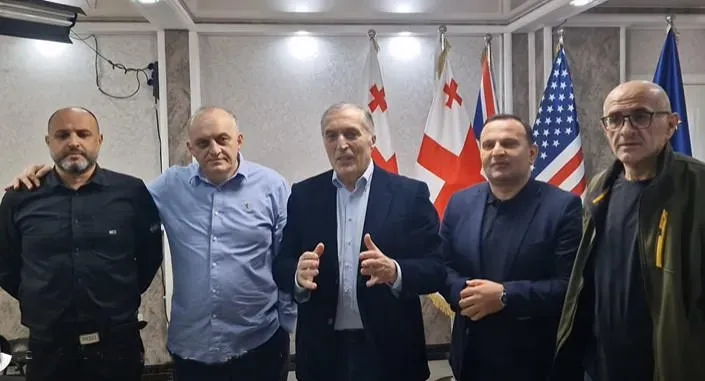
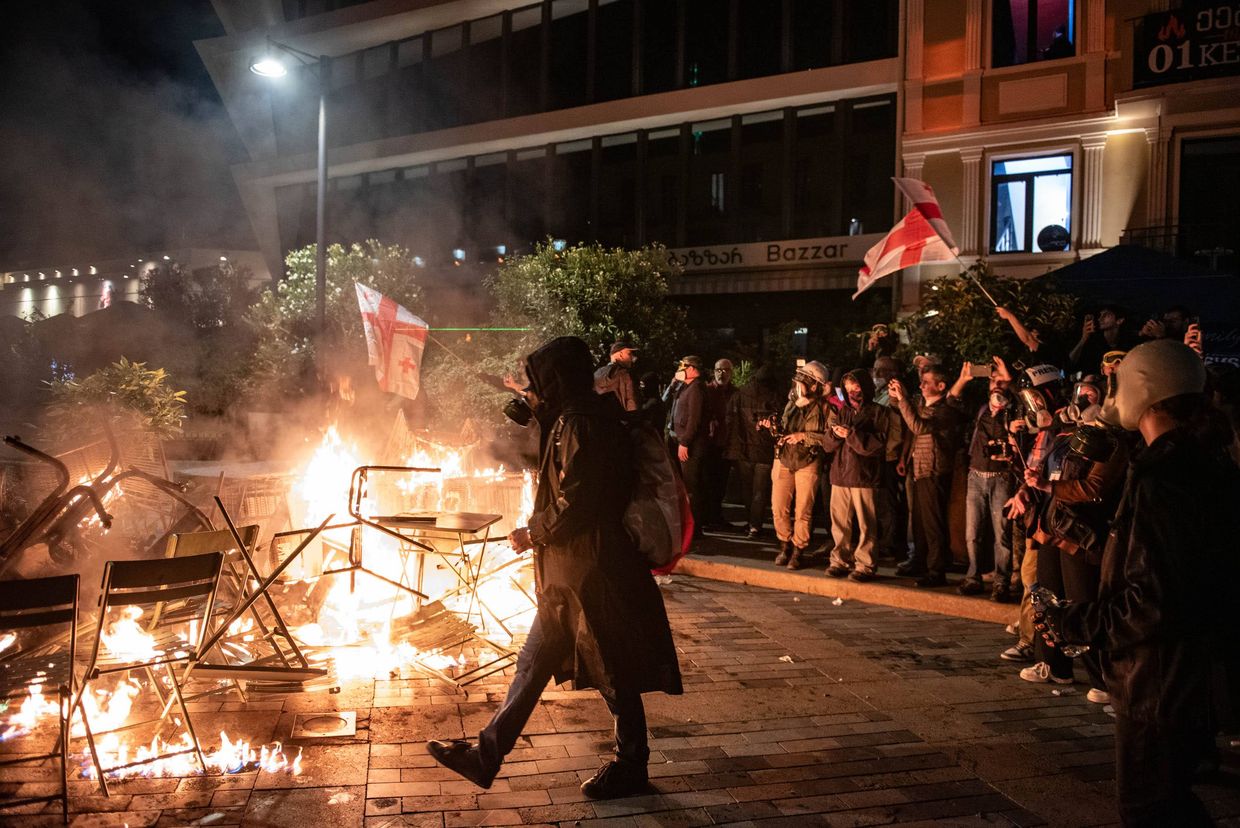
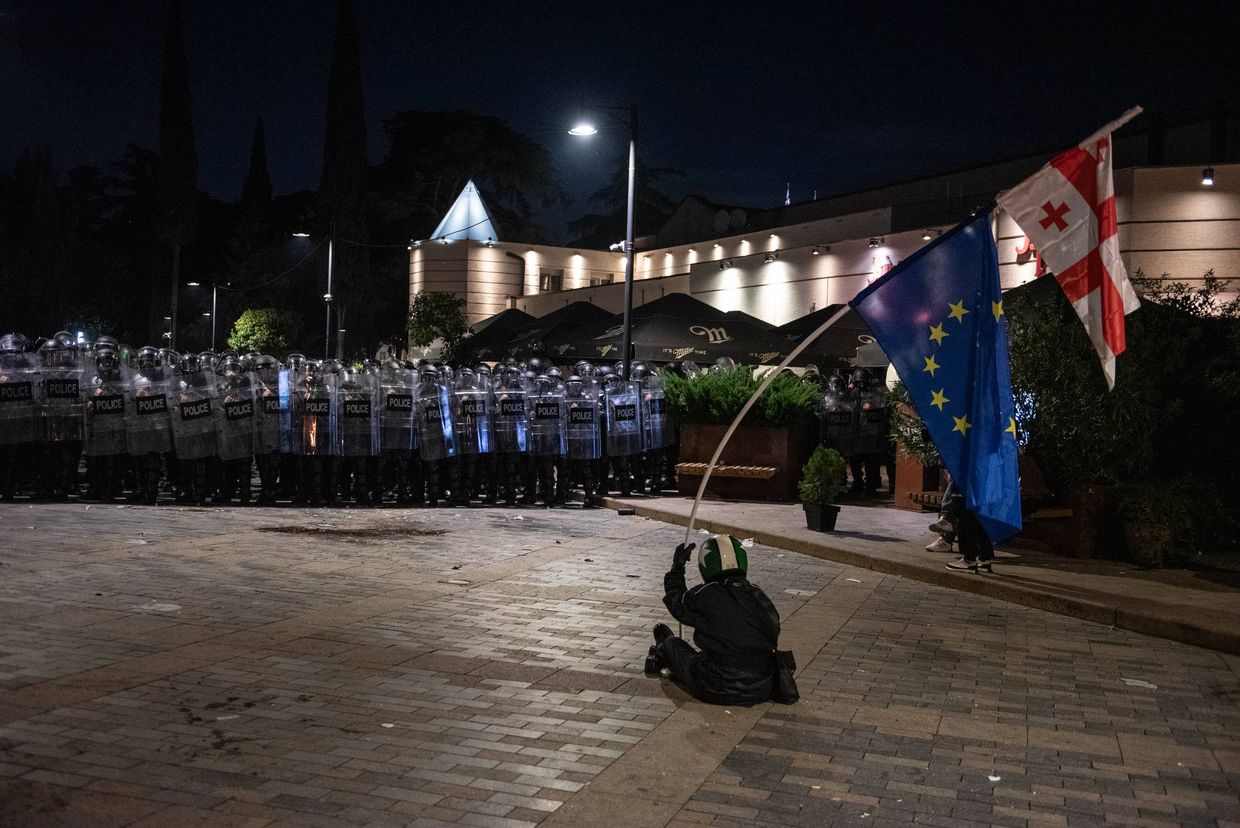
The clear failure to bring about rapid change ignited intense debate, with some accusing the now-detained organisers of irresponsibility, arguing they never had a real plan, alongside claims that state security services may have interfered to sabotage the ‘revolution’.
In the days that followed, suspicions grew that the palace fence may have been deliberately weakened to make it easier to breach, giving police a pretext for mass arrests. A report on the opposition-leaning TV station Pirveli, which analysed footage of the fence, lent weight to this theory.
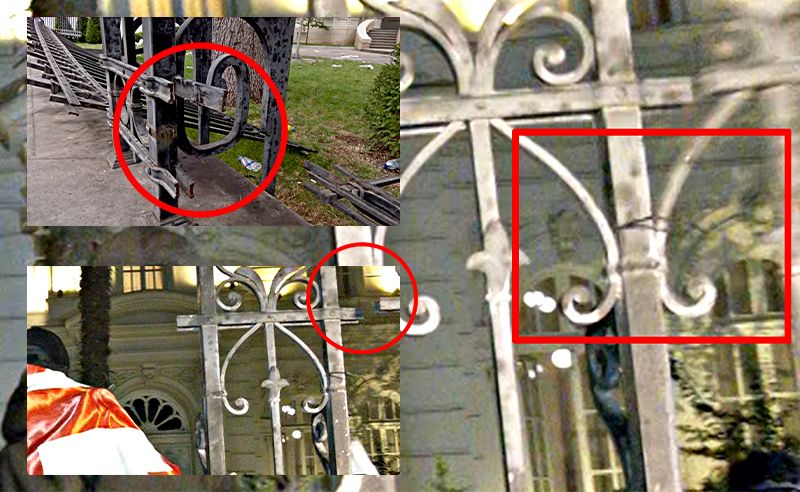
At the same time, theories emerged that the organisers may have been in contact with current or former officials supposedly discontented with the government, who promised inside help before ultimately betraying them.
The opposition-leaning TV channel Formula suggested that the former head of the State Security Service (SSG), Grigol Liluashvili, was one such ‘double agent’, citing an anonymous source without further evidence.
‘You can’t play with the fate of a protest’
The ruling party quickly seized on the presidential palace episode to once again attack the anti-government movement, branding it, as many times before, a violent, foreign-orchestrated campaign.
Within days, over 40 more protesters were detained, adding to the many already arrested during earlier waves of demonstrations. The arrests targeted people from across Georgia, including those with severe social and health issues — the court remanded all except two to pre-trial detention.
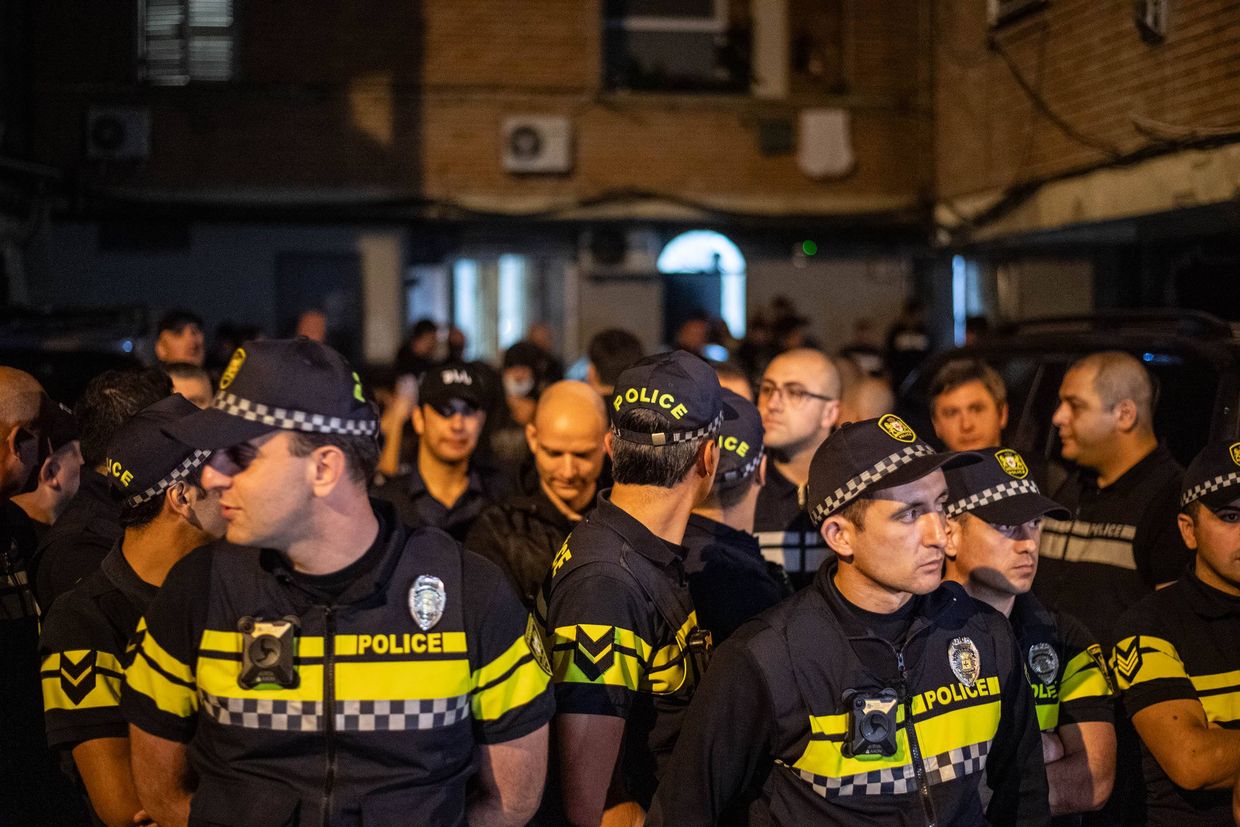
And while criticism of the government’s purge on dissent persisted, questions were also raised about the responsibility of some opposition figures involved in organising the rally.
‘You can’t play with the fate of a protest,’ Gota Chanturia, an activist involved in the daily anti-government demonstrations, tells OC Media.
Chanturia is among those who lead the daily march from the now-former Georgian Public Broadcaster (GPB) building to the parliament, carrying iconic slogans that have become rallying cries of the protests.
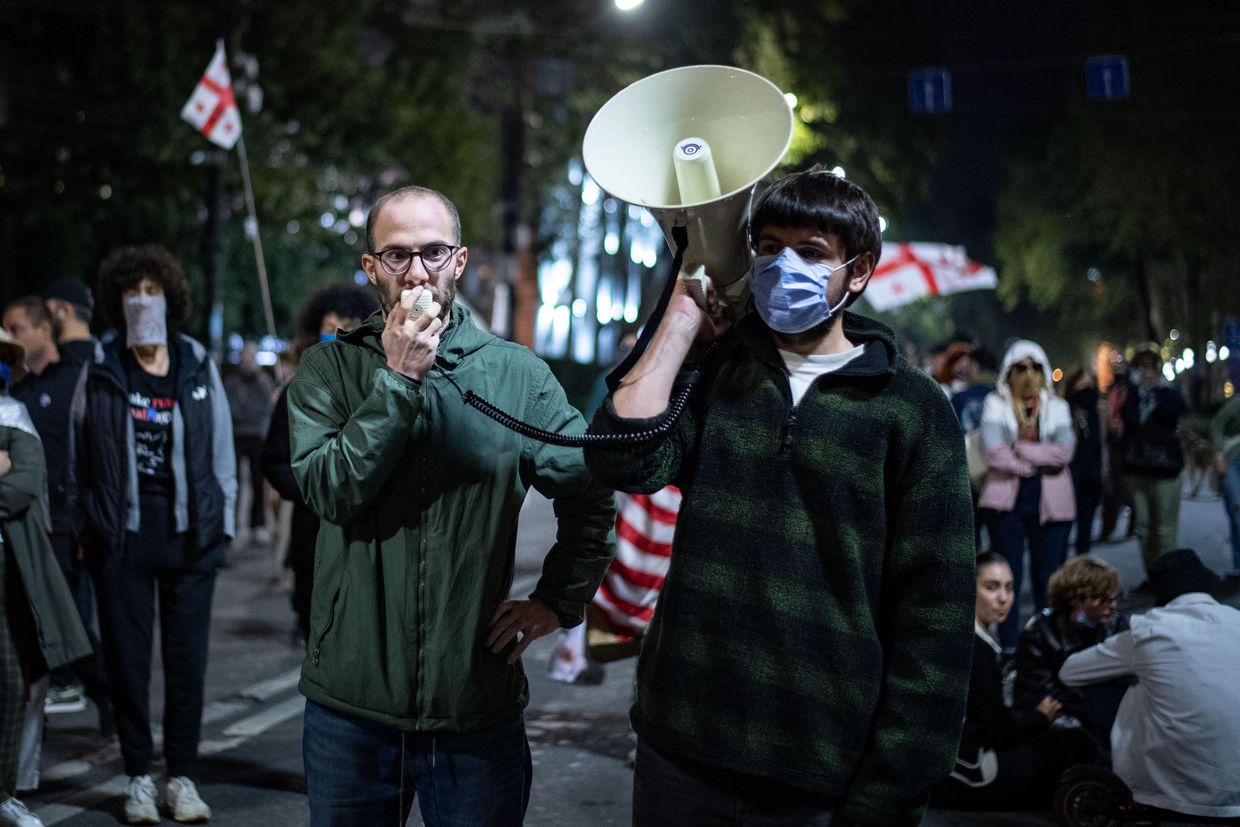
A member of the newly founded left-leaning Movement for Social Democracy, Chanturia was skeptical from the start about the prospects of the pre-announced revolution.
He believes the organisers of the 4 October rally tried to ‘surgically interfere’ with the protest and steer it in their own direction without understanding its dynamics.
‘A narrow group shows up, saying, “There’s five of us, and we’ll tell you what to do now”. What kind of inclusive or democratic process is that?’ he says, pointing to the organisers’ failure to consult their action plan with other protest groups.
‘Society won’t follow something they are not part of — especially the people that’ve been out and exhausted [by protesting] here for 300 days’, Chanturia adds, noting that most protesters did not follow the call to march towards the presidential palace.
Simon Janashia, an active participant of the protests and a member of the newly formed political party Freedom Square, agrees.

According to him, before 4 October, the organisers had spoken with several activist circles — yet, they did not reveal any plans, keeping their statements vague.
‘If you are there just to help [the organisers] to gain legitimacy, then you are becoming an instrument for a play you cannot control’, he says, adding that:
‘It was a strange story in a sense that no one knew what was going to happen, no one knew about the details of the plan […] including a party, members of which were organising this so-called peaceful revolution’.
Janashia was referring to the United National Movement (UNM) — the ruling party from 2003–2012, which is now in opposition. The UNM did not officially oversee the 4 October rally, though several of its leaders and members were involved in preparing and promoting the date.
The UNM’s political council chair, Levan Khabeishvili, a vocal proponent of the ‘revolution’, was arrested weeks earlier after publicly offering police money not to disperse protesters. Another party figure, Irakli Nadiradze, was among the five organisers detained at the end of the rally.
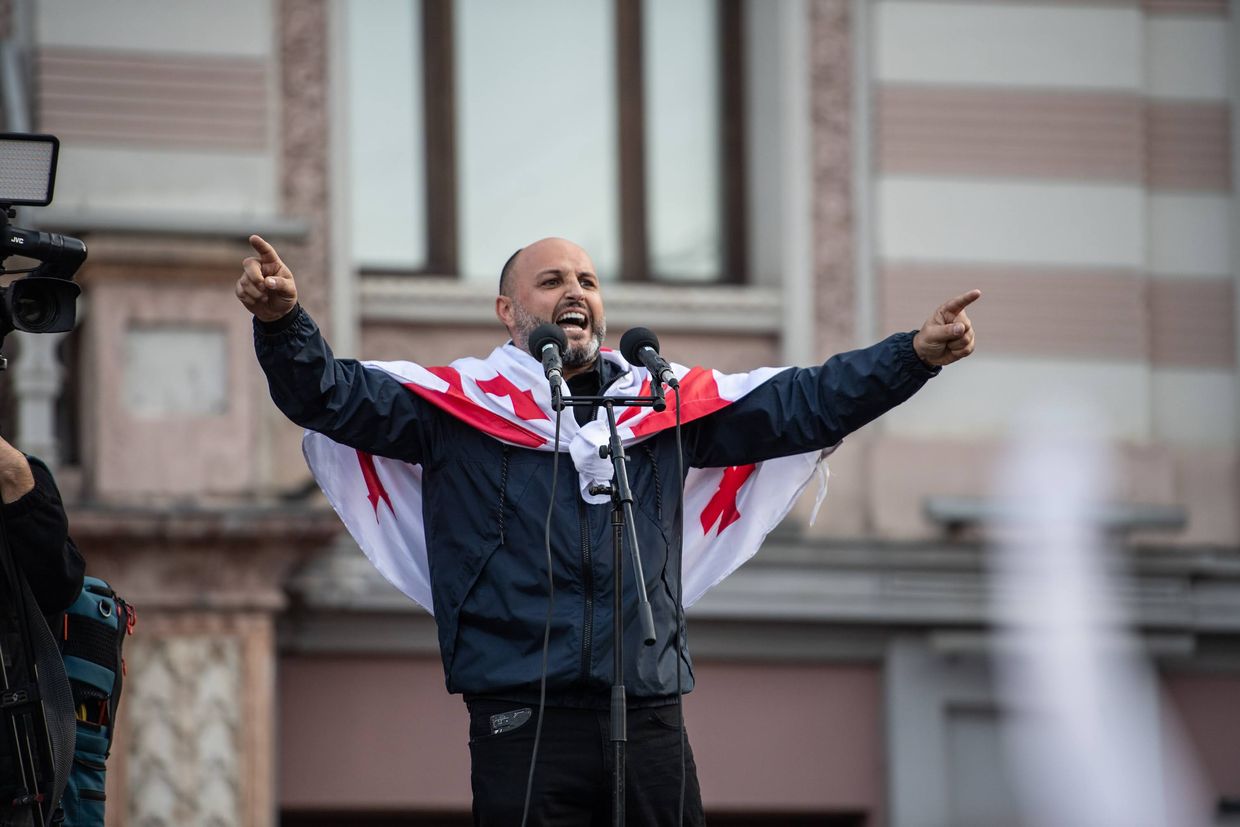
‘Anyone pointing a finger at the [organisers] is just masking their own cowardice and fear!’, Ana Tsitlidze, one of the UNM’s leading members, tells OC Media.
‘Whatever courage they showed, let any of those come forward and show the same’, she adds.
Tsitlidze, who also urged people to join the 4 October protest, insists that the organisers did have a plan, defending its secrecy on security grounds.
‘In a regime where three out of ten are [agents of the State Security Service] [...] how could even ten people know a revolutionary plan? We don’t have democratic space here’, she argues.
According to Tsitlidze, the full plan was known only to a ‘very narrow circle’ all of whom are now in prison, referring to the detained organisers.
Although she said she was not aware of the plan’s specific details, Tsitlidze emphasises ‘with full responsibility’ that it was ‘entirely peaceful’.
‘We were there with our families, with our young children. Who could imagine planning violence and showing up there with [their] family?’

While she does not agree with what she called the ‘lynching’ of the organisers, Tsitlidze also expects answers from the detainees:
‘So what happened at Atoneli Street, and why wasn’t everything executed as planned? These are the questions the organisers need to answer’, she concedes.
Recriminations follow — who really lost on 4 October?
For Tsitlidze, the only loser on that day was the ruling party.
‘It was the first time in 13 years [of Georgian Dream’s rule] that citizens came out in response to a declared revolution,’ she says.
For others, the outcome of the day is equally clear — but in the opposite sense.
‘We now have more prisoners, stronger propaganda [against us], they [the state] have greater legitimacy for violence, and we are far weaker and more vulnerable,’ Chanturia says.
Although she liked the idea of peacefully ending the Georgian Dream’s rule in a single day, 23-year-old student activist Megi Diasamidze finds it hard to believe such a plan was realistic.
‘In those days, I felt this is what it means to live in terror’, Diasamidze recalls of the days following 4 October, when the Interior Ministry announced new arrests every night, revealing only the detainees’ initials.
‘They’d read the initials, and you’d start checking if any of your friends were among them. You’d go down to Rustaveli [Avenue], move between groups, everyone calling each other […] Then, when we saw none of our people were among the names, we’d look for those who were, to make sure they weren’t left alone’, she tells OC Media.
Diasamidze herself has also become a target of what many critics call politically motivated justice: in September, she was criminally charged for defacing a Georgian Dream election banner. She was later released on bail.
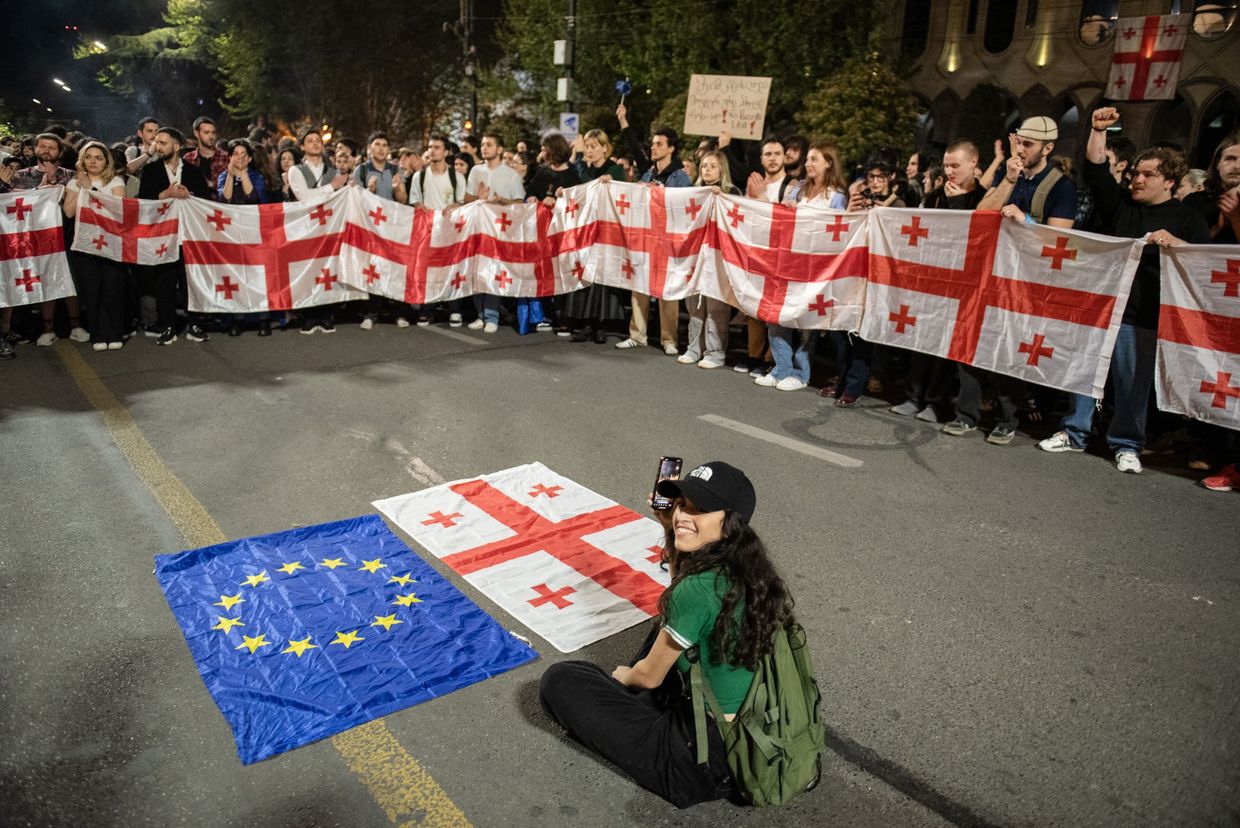
Now, discussing 4 October, the activist refrains from criticising the organisers, noting that they also ‘put themselves on the line’ and are now behind bars.
‘Once they’re out, then it will be possible to talk to them about many things — I’ll wait to hear what they say in court’, she says.
Further reflecting on the challenges that followed 4 October, Diasamidze agrees that government propaganda has intensified — and that the authorities are now using the presidential palace episode to discredit protesters in the eyes of those who had not previously turned against them.
‘A few [people] around me said things like, “Well, if they were breaking the fence, of course they should be arrested” ’, she says, adding that the ruling party sought to strip protesters from ‘the moral advantage’ which they had gained amid state repressions.

Indeed, the government’s attempts to discredit the protest did not begin on 4 October. For months, Georgian Dream and its affiliated media have portrayed the protests on Rustaveli Avenue as marginal gatherings of ‘radicals’, which did not represent the broader public will.
Yet, according to sociologist Iago Kachkachishvili, head of the Tbilisi-based Institute of Social Studies and Analysis (ISSA), one of the key takeaways from 4 October was the clear refutation of that claim.
‘For both the authorities and opposition-minded citizens, [the turnout] was a sign that the protest remains active and alive — despite the continuous repressions the Georgian Dream government has been carrying out weekly and almost daily’, he tells OC Media.
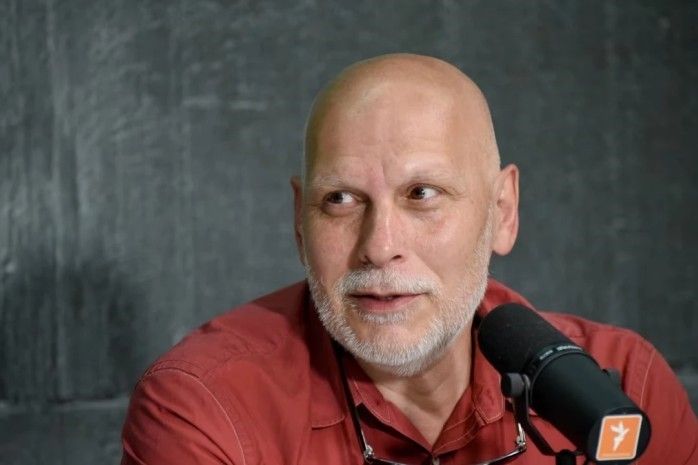
According to Kachkachishvili, while the government has ‘wrapped the presidential palace episode around its finger’ as a ‘more legitimate pretext’ for repression, it still struggles, despite repeated efforts, to marginalise the protest movement beyond its own voter base.
‘The five organisers may face criticism, including from opposition groups and parties, yet the main culprit in this situation is still seen as Georgian Dream’s authoritarianism’, Kachkachishvili adds.
He also does not believe that the protest movement was damaged, noting that ‘the violent episode was local and quickly dissipated’ and that ‘the movement did not identify with this violence’.
‘Apparently, the protesting public has opted for a peaceful, long-term, and routine form of protest rather than acknowledging the possibility of an immediate change in power’, he says.
However, the prospect of such a dynamic is not clear to everyone.
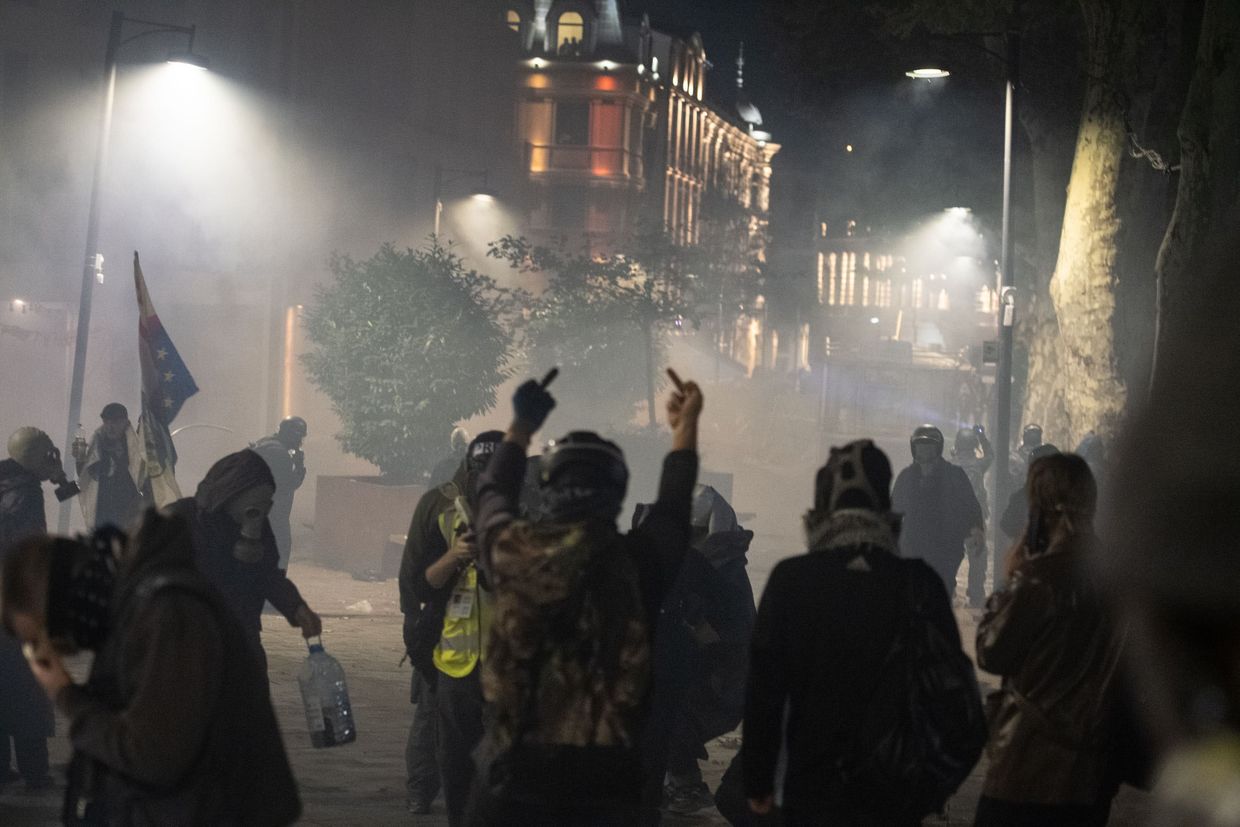
‘Are we here just for the statistics, to break a record? Is this a concert where you go and come home in two hours?’, Rezo Kiknadze, a protester arrested in the early phase of the protests, asked from prison.
‘Don’t you realise that the longer this drags on, the weaker we become and the more people we lose?’.
Chanturia, reflecting on such views, argues that the lack of a concrete alternative within the daily protest movement for the broader opposition-minded public may have drawn many to be captivated by the promise of rapid change on 4 October:
‘Society needs this alternative political project. I see our culpability in this — mine, our group’s, and that of the other groups who want change and approach the process with a clear-eyed perspective’.
What’s next — and where do the opposition stand?
Many of those detained during previous waves of protests have already been convicted, and a large number of opposition leaders remain behind bars on various charges. Meanwhile, new restrictive laws continue to target a wide range of government critics — including independent media and civil society, threatening their very existence.
Against this backdrop, the daily protests on Rustaveli Avenue are more than just a form of symbolism for many government opponents.
‘[The] Rustaveli protest is a crucial defensive line preventing authoritarianism from fully taking hold’, Chanturia says.
Chanturia has already accumulated 76 fines for blocking the road totaling ₾380,000 ($140,000). Many other activists protesting daily in central Tbilisi face a similar situation.

For Chanturia, proof that the government is still unsettled by the protests lies in the hostility from Georgian Dream leaders, including Prime Minister Irakli Kobakhidze.
The party’s aggressive rhetoric increased after 4 October, with the authorities announcing ‘systemic steps’ against the Rustaveli protesters and dismissing the demonstrators as foreign-backed agents.
‘We have zero sympathy for these people’, Kobakhidze declared on 6 October.
Despite the threats and disappointments, the persistence of the protests, reinforced by the turnout on 4 October, has led some to believe that the movement shows no signs of stopping anytime soon.
‘The opposition-minded public won’t stop without active protest. This resistance hasn’t broken’, Kachkachishvili notes.
But resistance, too, has its shortcomings. As chair of the Georgian Democracy Initiative (GDI) Eduard Marikashvili wrote in a column for OC Media, there is a ‘vast middle of Georgian society’ that, while not aligned with the government, has also stayed away from the protests.
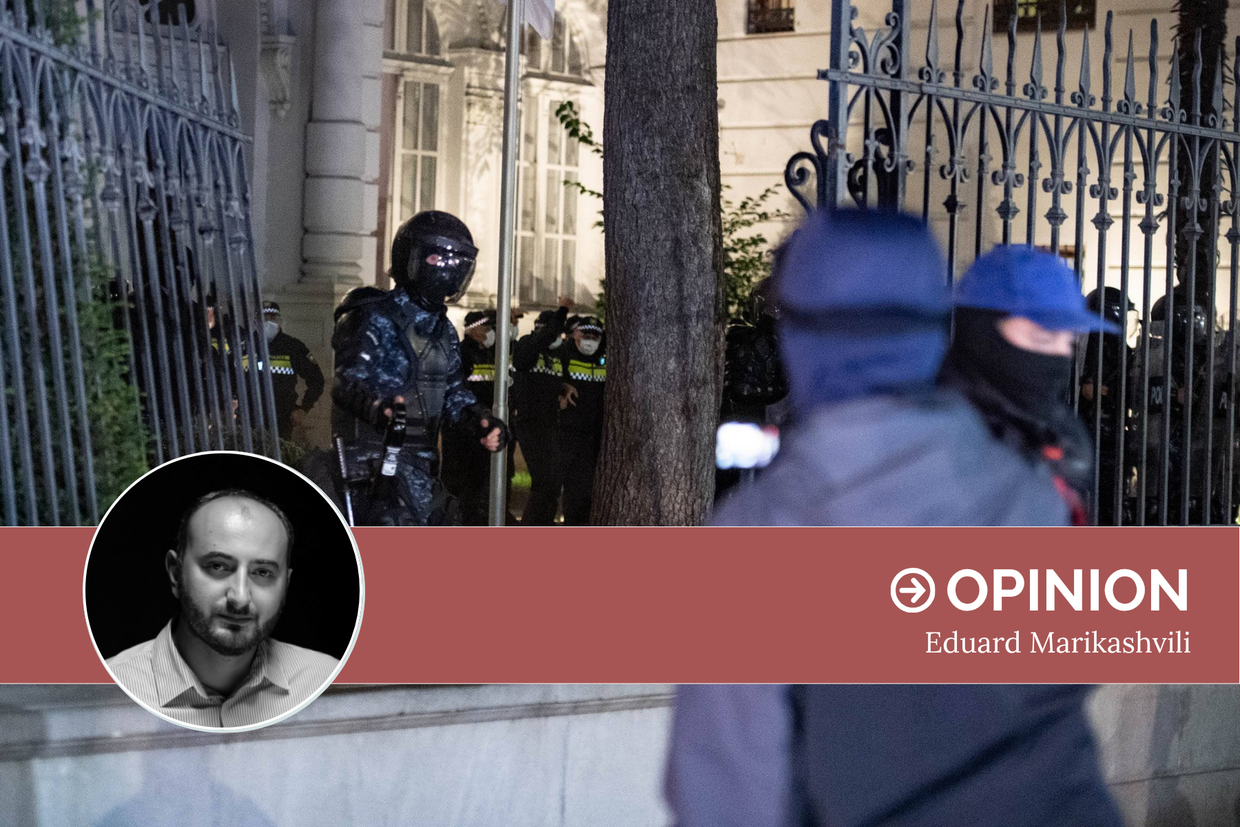
According to Marikashvili, Georgian Dream’s strategy continues to work as long as ‘democratic forces keep reacting instead of acting, keep dividing instead of uniting’ and ‘keep speaking to themselves’ instead of reaching to the wider public.
What Marikashvili describes is, for Chanturia, a phenomenon of ‘broken bridges’ — one he has experienced both within and beyond protest circles.
‘Society is fragmented today. When we shouted “Solidarity with Chiatura”, some groups protested, saying that those people are Georgian Dream supporters and why should we care about Chiatura?’ he says, referring to the miners’ protest in central Georgia.
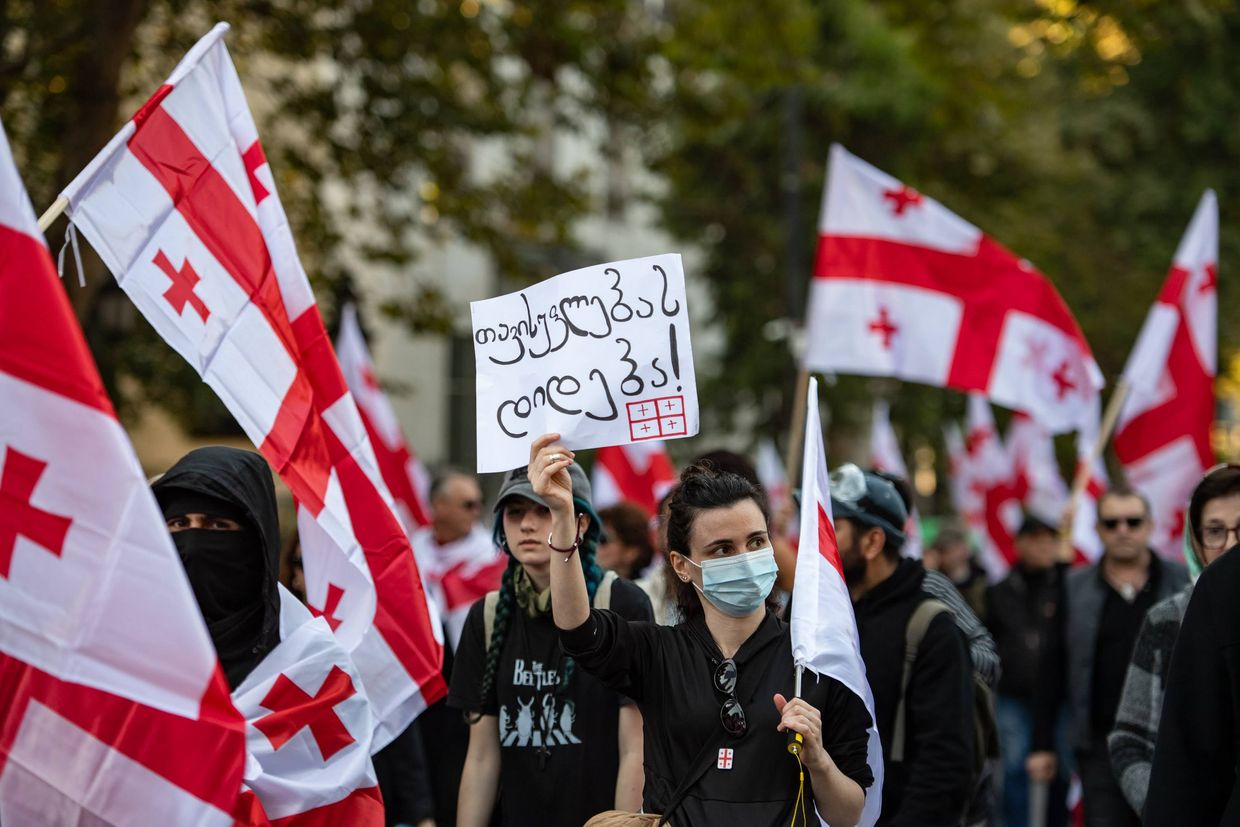
He said he saw a similar alienation among the miners, who, influenced by government propaganda, associated Tbilisi’s protesters with ‘rootlessness’ and certain political groups.
‘We’re stuck in this dichotomy: those people here are seen as bad, and these ones there as well. If we manage to build bridges, we’ll see that we share common interests and concerns. That’s the new political project we need to work on,’ he says.
Where, then, do established political actors — the parties themselves — fit into this or any other political project?
While mainstream opposition parties are present in the protest movement, their involvement rarely goes beyond the individual participation of members. Aside from certain rallies, their role has been limited.
Now, as Georgian Dream openly signals its intention to ban major opposition parties through the Constitutional Court, accusing them of anti-state activities, the future looks even more uncertain.
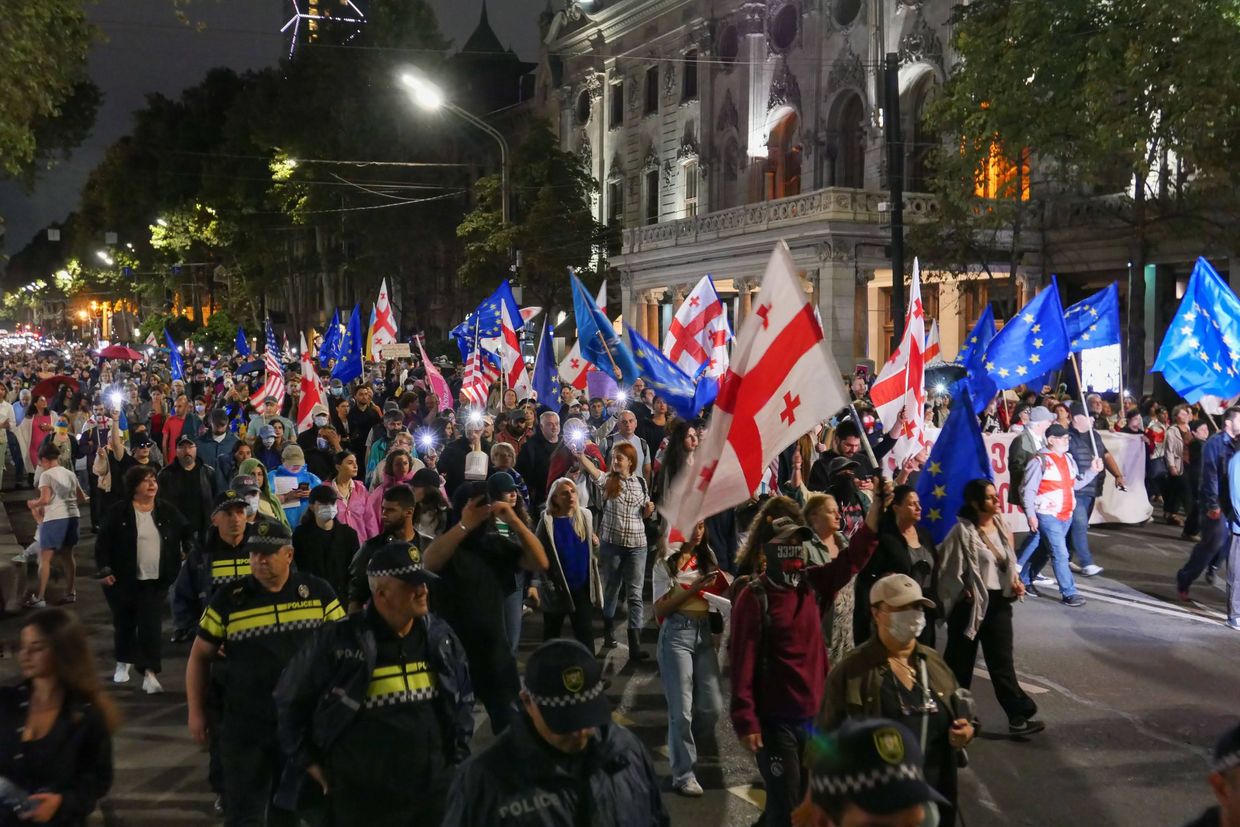
‘[Georgian Dream founder] Bidzina Ivanishvili has killed politics and political parties in this country,’ Tsitlidze says, adding that ‘there are no such things like resources of parties or party mobilisation anymore’.
Tsitlidze, who sees ‘revolutionary change’ as the only path to a transition of power, insists that if someone else were to lead this kind of change, ‘UNM supporters would still show up’.
‘Our people are standing on Rustaveli too — they just don’t care about political parties anymore,’ she says.
However, state repression is not the only problem facing Georgian political parties. Another issue, which Kachkachishvili calls a ‘legitimacy crisis’, is that substantial segments of the population often fail to see themselves represented by any party.
Internal divisions and failed or fragile alliances add to the challenge, and today, these tensions are more visible than ever.
‘They are more focused on sinking each other than on cooperating. If one missteps, it’s not only Georgian Dream that punishes them — rival opposition parties do too’, Kachkachishvili says.
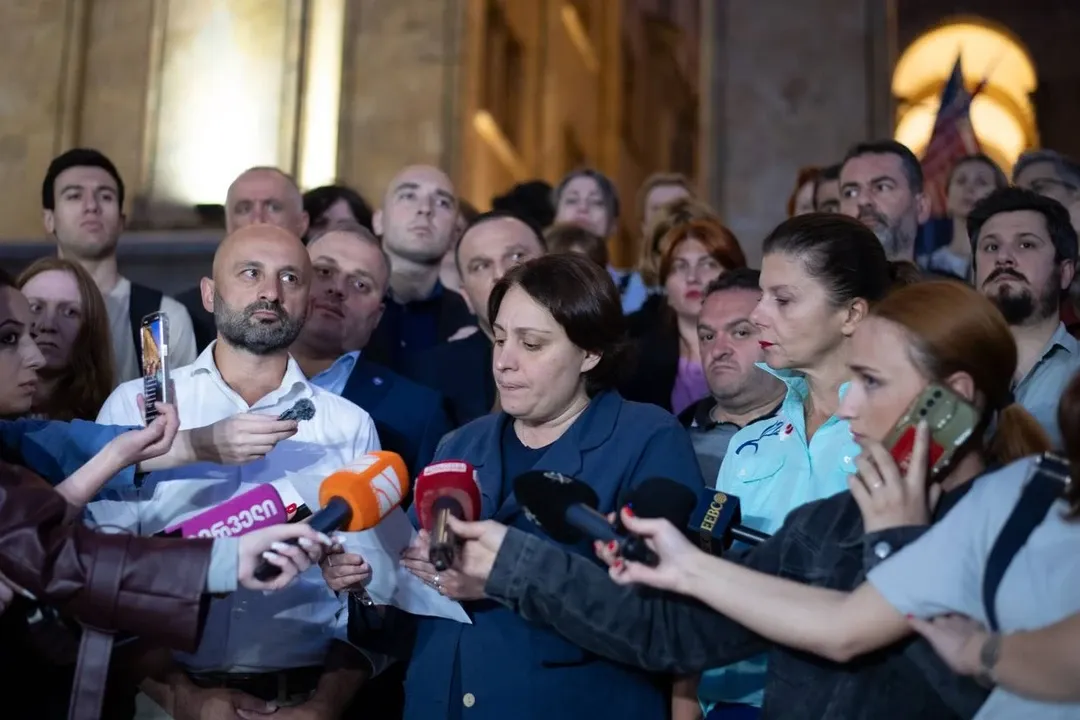
Amidst the uncertain reality, others remain relatively optimistic about party-building, with newer parties, such as the Federalists and Freedom Square, active both in the protests and beyond.
Janashia, a member of Freedom Square, notes that the party, as a new and non-traditional actor, ‘is now gaining more and more supporters’.
‘People see that unless the protest is organised politically, unless it has protection in the form of a political party […] this protest is not going to succeed by just physical participation in it’, he says.
Diasamidze agrees, noting that ‘after all, resistance is a political process’.
‘Rustaveli’s protest will determine a lot. In my view, parties will gain trust depending on how they act in response to this protest’, he says.
Another question is over how much time there is left to act. Janashia believes that time is a problem for the ruling party, but this doesn’t necessarily mean that time works in favour of the protest movement.
‘There are people losing their jobs and there are people that are fined large sums of money. There are people emigrating from the country, giving up, and so on’, he says.
‘Patience is the problem, but I think 4 October was important for many to realise that impatience can come with a very, very high risk’, he adds.
As the uninterrupted protest movement nears its first anniversary, the path ahead remains as uncertain as ever.
Note: Since speaking with the people above, the ruling party has introduced and rushed through parliament more anti-protest amendments, intensifying the debate over the future of the protest movement.
Under the new rules, blocking Rustaveli Avenue could lead directly to imprisonment rather than fines. Additionally, the court would have the power to ban not only political parties but also individual politicians from political activity.






![Baia Margishvili standing in central Tbilisi with a sign reading: ‘The Prosecutor’s Office [is] a punitive squad. How many more innocent people will you put in prison?’ Photo: Mariam Nikuradze/OC Media.](/_next/image/?url=https%3A%2F%2Fassets.bucket.fourthestate.app%2Foc-media-prod%2Fcontent%2Fimages%2F2026%2F02%2Fcalls-for-sanctions-and-raids-19-10-25-48.jpg&w=3840&q=50)




